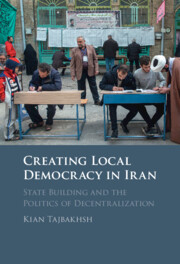Book contents
- Creating Local Democracy in Iran
- Creating Local Democracy in Iran
- Copyright page
- Contents
- Figures
- Tables
- Preface: Stumbling on Local Democracy (My Personal Journey)
- Acknowledgments
- Overview of the Book
- Abbreviations
- Part I Launching Local Democracy
- Part II Arguing for Local Democracy
- 3 Reformists, Local Democracy, and Civil Society
- 4 Efficiency in Governance
- 5 The Theocratic and Islamist Discourse on the Shura
- Part III Blocking Local Democracy
- Index
4 - Efficiency in Governance
Technocratic Discourse
from Part II - Arguing for Local Democracy
Published online by Cambridge University Press: 07 July 2022
- Creating Local Democracy in Iran
- Creating Local Democracy in Iran
- Copyright page
- Contents
- Figures
- Tables
- Preface: Stumbling on Local Democracy (My Personal Journey)
- Acknowledgments
- Overview of the Book
- Abbreviations
- Part I Launching Local Democracy
- Part II Arguing for Local Democracy
- 3 Reformists, Local Democracy, and Civil Society
- 4 Efficiency in Governance
- 5 The Theocratic and Islamist Discourse on the Shura
- Part III Blocking Local Democracy
- Index
Summary
After the war with Iraq (1980–1988), Iran had to reconstruct the economy and the government’s public management systems to address mounting challenges of urban poverty, low economic growth, and poor local management, which had led to significant urban unrest in several cities. The technocratic response of the Rafsanjani administration (1989–1997) included tentative steps to decentralize some central government functions to municipalities and a mandate for them to become financially self-sufficient. The technocrats supported decentralization for instrumental or pragmatic reasons of increasing the efficiency of local administration, not for empowering local democracy. I interpret the tensions between the competing imperatives of the Iranian decision to decentralize by distinguishing two ways a state can be strong, or between what I call good and bad centralization. In so doing, I draw on the distinction of two types of power introduced by Michael Mann, “infrastructural” power – the power of states to achieve collective purposes – and “despotic” power – the capacity of government to exert power over society and individuals. While both authoritarian and democratic states seek to augment the former, authoritarian states depend on strengthening the latter. By their indifference to the goal of checking despotic power, the technocratic endorsement of decentralization worked against democratization and dovetailed with the velayi goal of augmenting both forms of power together toward the goal of Islamizing society and state. At the same time, the failure to promote local economic development through decentralization must be considered a failure of the technocratic agenda.
Keywords
- Type
- Chapter
- Information
- Creating Local Democracy in IranState Building and the Politics of Decentralization, pp. 104 - 125Publisher: Cambridge University PressPrint publication year: 2022



